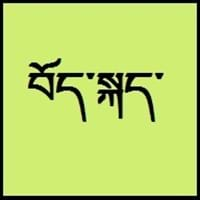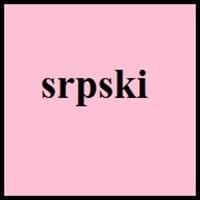Countries
China, Nepal
Bosnia and Herzegovina, Kosovo, Serbia, Slovakia
National Language
Nepal, Tibet
Bosnia, Croatia, Montenegro, Serbia
Second Language
Not spoken in any of the countries
Not spoken in any of the countries
Speaking Continents
Asia
Europe
Minority Language
China, India, Nepal
Croatia, Czech Republic, Hungary, Macedonia, Montenegro, Romania, Slovakia
Regulated By
Committee for the Standardisation of the Tibetan Language
Board for Standardization of the Serbian Language
Interesting Facts
- Tibetan dialects vary alot, so it's difficult for tibetans to understand each other if they are not from same area.
- Tibetan is tonal with six tones in all: short low, long low, high falling, low falling, short high, long high.
- Serbian language was derived from the Old Church Salvic, as the language was commonly spoken by most of Slavic people in the 9th Century.
- Serbian language is based on Stokavian dialect.
Similar To
Not Available
Bosnian and Croatian Languages
Derived From
Not Available
Not Available
Alphabets in
Tibetan-Alphabets.jpg#200
Serbian-Alphabets.jpg#200
Scripts
Tibetan alphabet, Tibetan Braille
Cyrillic, Latin
Writing Direction
Left-To-Right, Horizontal
Left-To-Right, Horizontal
Hello
བཀྲ་ཤིས་བདེ་ལེགས། (tashi delek)
Здраво (Zdravo)
Thank You
ཐུགས་རྗེ་ཆེ་། (tujay-chay)
Хвала лепо (Hvala lepo)
How Are You?
ཁྱེད་རང་སྐུ་གཇུགས་བདེ་པོ་ཡིན་པས།
(kayrang kusu debo yimbay?)
Како си? (Kako si?)
Good Night
གཟིམ་ལཇག་གནང་དགོས་། (sim-jah nahng-go)
Лаку ноћ (Laku noć)
Good Evening
དགོང་དྲོ་བདེ་ལེགས།
Добро вече (Dobro veče)
Good Afternoon
ཉིན་གུང་བདེ་ལེགས།
Добар дан (Dobar dan)
Good Morning
སྔ་དྲོ་བདེ་ལེགས། (nga-to delek)
Добро јутро (Dobro jutro)
Please
thu-je zig / ku-chee.
Молим (Molim)
Sorry
ཀོང་དགས་། (gawn-da)
Жао ми је (Žao mi je)
Bye
ག་ལེར་ཕེབས་། (kha-leh phe)
Довиђења (Doviđenja)
I Love You
ང་ཁྱེད་རང་ལ་དགའ་པོ་ཡོད་ (nga kayrâng-la gawpo yö)
Волим те (Volim te)
Excuse Me
དགོངས་དག བཟོད་དུ་གསོལ། ཐུགས་རྗེ་གཟིགས།
Извините (Izvinite)
Dialect 1
Central Tibetan
Prizren-Timok
Where They Speak
China, India, Nepal
Southeastern Serbia
How Many People Speak
Not Available
Dialect 2
Khams Tibetan
Smederevo–Vršac
Where They Speak
Bhutan, China
Serbia
How Many People Speak
Not Available
Dialect 3
Amdo Tibetan
Torlakian
Where They Speak
China
Bulgaria, France, Kosovo, Macedonia, Romania, Serbia
Speaking Population
Not Available
Not Available
Native Name
བོད་སྐད་ (pö-gay)
српски (srpski) српски језик (srpski jezik)
Alternative Names
Bhotia, Dbus, Dbusgtsang, Phoke, Tibetan, U, Wei, Weizang, Zang
Montenegrin
French Name
tibétain
serbe
German Name
Tibetisch
Serbisch
Pronunciation
Not Available
[sr̩̂pskiː]
Ethnicity
tibetan people
Serbs
Origin
c. 650
11th Century
Language Family
Sino-Tibetan Family
Indo-European Family
Subgroup
Tibeto-Burman
Not Available
Branch
Not Available
Not Available
Early Forms
Old Tibetan, Classical Tibetan
No early forms
Standard Forms
Standard Tibetan
Standard Serbian
Language Position
Not Available
Signed Forms
Tibetan Sign Language
Not Available
Scope
Not Available
Individual
ISO 639 6
Not Available
Not Available
Glottocode
tibe1272
serb1264
Linguasphere
No data Available
53-AAA-g
Language Type
Not Available
Living
Language Linguistic Typology
Not Available
Subject-Verb-Object
Language Morphological Typology
Not Available
Not Available
Tibetan and Serbian Greetings
People around the world use different languages to interact with each other. Even if we cannot communicate fluently in any language, it will always be beneficial to know about some of the common greetings or phrases from that language. This is where Tibetan and Serbian greetings helps you to understand basic phrases in Tibetan and Serbian language. Tibetan word for "Hello" is བཀྲ་ཤིས་བདེ་ལེགས། (tashi delek) or Serbian word for "Thank You" is Хвала лепо (Hvala lepo). Find more of such common Tibetan Greetings and Serbian Greetings. These greetings will help you to be more confident when conversing with natives that speak these languages.
Tibetan vs Serbian Difficulty
The Tibetan vs Serbian difficulty level basically depends on the number of Tibetan Alphabets and Serbian Alphabets. Also the number of vowels and consonants in the language plays an important role in deciding the difficulty level of that language. The important points to be considered when we compare Tibetan and Serbian are the origin, speaking countries, language family, different greetings, speaking population of these languages. Want to know in Tibetan and Serbian, which language is harder to learn? Time required to learn Tibetan is 24 weeks while to learn Serbian time required is 44 weeks.





